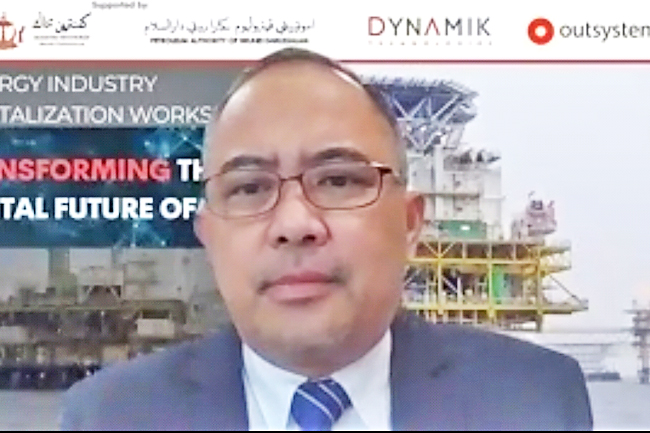James Kon
The unprecedented COVID-19 pandemic for the last two years has transformed life in a big way. The new normal are where physical mobility and interaction is limited which also impact several aspects of businesses and other operations. This shift in ways of living and working has contributed to the acceleration of technology deployments as well as ability to adapt to the new normal.
This was said by Permanent Secretary at the Ministry of Energy and Managing Director of Petroleum Authority of Brunei Darussalam Haji Azhar bin Haji Yahya in his keynote address as the guest of honour at the virtual workshop for the Oil and Gas industry titled ‘Transforming the Digital Future of Energy’ organised by Dynamik Technologies Sdn Bhd and supported by the Ministry of Energy and Petroleum Authority of Brunei Darussalam.
“We have witnessed information technology groups worldwide swing overnight to launch technology-driven initiatives to enable remote work as a necessity as well as adoption of technologies required to allow us to continue our day-to-day activities during the pandemic,” he said.
“Today,” he added, “digital solutions have come to be an expectation rather than an exception. Digitalising the architecture of our operations is no longer the method to only attain higher performance, but it is now much more fundamental. We have seen digital transformation plans that would have taken years to be implemented, took just weeks to be rolled out due to instant requirements, and business models that were dependent on being executed ‘in-person’ have successfully been delivered digitally”.
The permanent secretary also said It is exciting to witness the fast-growing digital transformation space in this pandemic and post-pandemic era. “Indeed, the widespread utilisation of digital solutions and all the necessary enablers to accelerate, improve and secure its applications will be something that every government or organisation will be very interested in.”

The Fourth Industrial Revolution, he said, “Has helped to bring about tremendous advancements in digital technology and this rapidly moving technology is a game changer and will shape the future of many industries, and the oil and gas industry is no exception. In fact, digitalisation is not new for the oil and gas industry. It started as early as in 1959 where the first industrial control computer system was first introduced at Texaco Port Arthur Refinery, Texas. Since then, digitalisation and technological innovation in the oil and gas industry has been continuously evolving worldwide including Brunei Darussalam, in moving towards a future that allows the industry to reap the benefits, from increased efficiency and performance which translates into reduced operating cost and improved safety performance. This includes the utilisation of artificial intelligence in smart drilling, smart well, smart field and facilities, which allow 24/7 remote monitoring.”
On the opportunities brought about by digitisation, he said, “As part of continuous improvement in our ways of working, there are also more opportunities to adopt further digitalisation methods in the oil and gas industry. For example, open (protocol) digital platform where data from different sources can be centralised and that will tremendously expedite data movement from remote field locations to the experts for further analysis; ultimately assisting towards faster decision making with more complete, instant data. This instant data availability, leveraging on the Industry Internet of Things (IIOT:IR4.0), will pave the way for better connectivity hence reduces logistic requirements, which is an issue with current manpower availability and COVID restrictions, and at the same time, will reduce the exposure of risks of travelling to remote platforms especially during the monsoon seasons.”
However, Haji Azhar also cited the threat of cyberattacks as one of the threat with the increase in digitisation.
“These incoming data, if not properly managed, can become a deluge. It can be overwhelming to find added value in these data, even for the experts thus eroding the value of instant data availability. This, in turn, will have impact on operations. In the new normal of transitioning towards ‘open’ communication, it can also invite malicious attacks, specifically in the form of cyberattacks. We have seen many industries experiencing these including the oil and gas industry. As we are handling delicate operations in oil and gas including volatile liquids and high pressure gases in the field, the impact of these cyberattacks on the automation systems can have a huge impact on the operations, which may lead to dire consequences.”
Hence, he iterated, “any digital solutions shall be equipped with a robust cybersecurity feature to ensure the integrity of the system while ensuring business continuity.
“Cybersecurity shall be weaved into the designing and building of the digital transformation strategy, and not to be treated just as an afterthought to address the fast-evolving threat.
“With the pandemic introducing newer levels of risks, we have to leverage on both proactive and reactive measures to ensure business continuity and to appreciate the competitive benefits of the digital solutions.”
He said, “One angle of consideration, we can make as we are catching up with the technological advancements in our work setting and daily lives is that the technologies or innovation to be implemented in the industries shall revolve around simplifying and making the job easier, rather than just ‘keeping up with the technologies’.
“In other words, it would be prudent and to reap more benefits by targetting simpler and sustainable technologies with huge added value that match the current problem statements in the oil and gas industry.”



















































